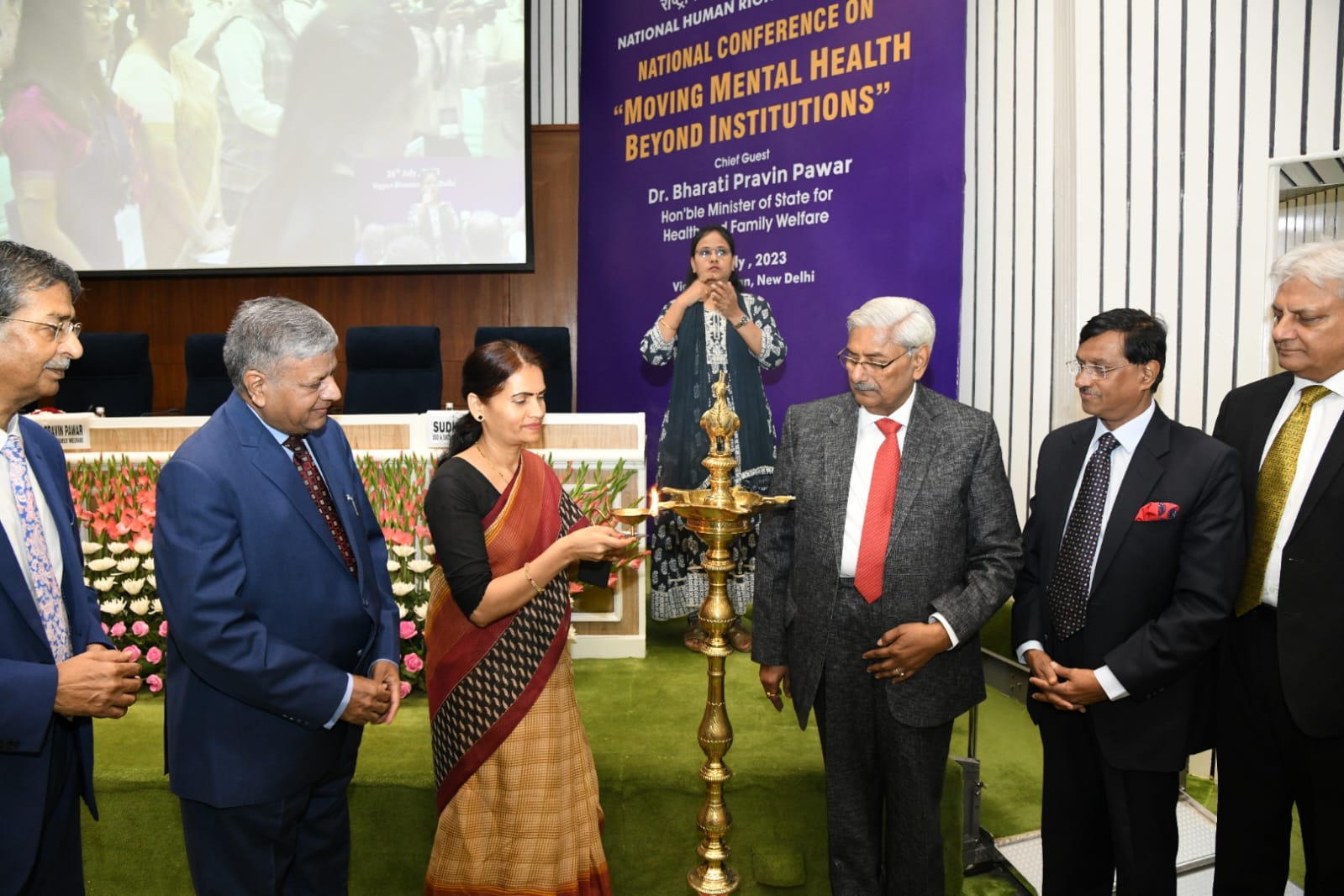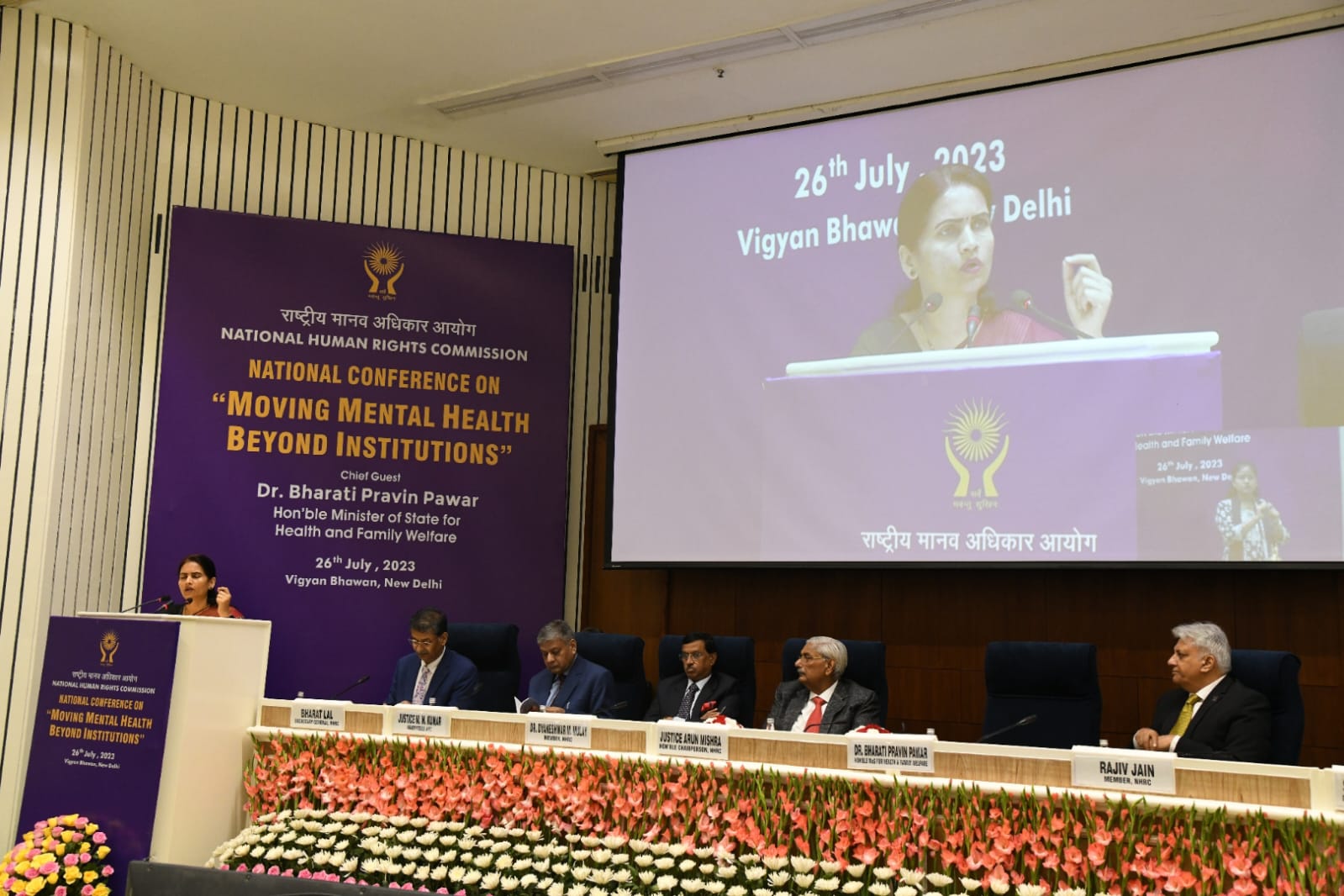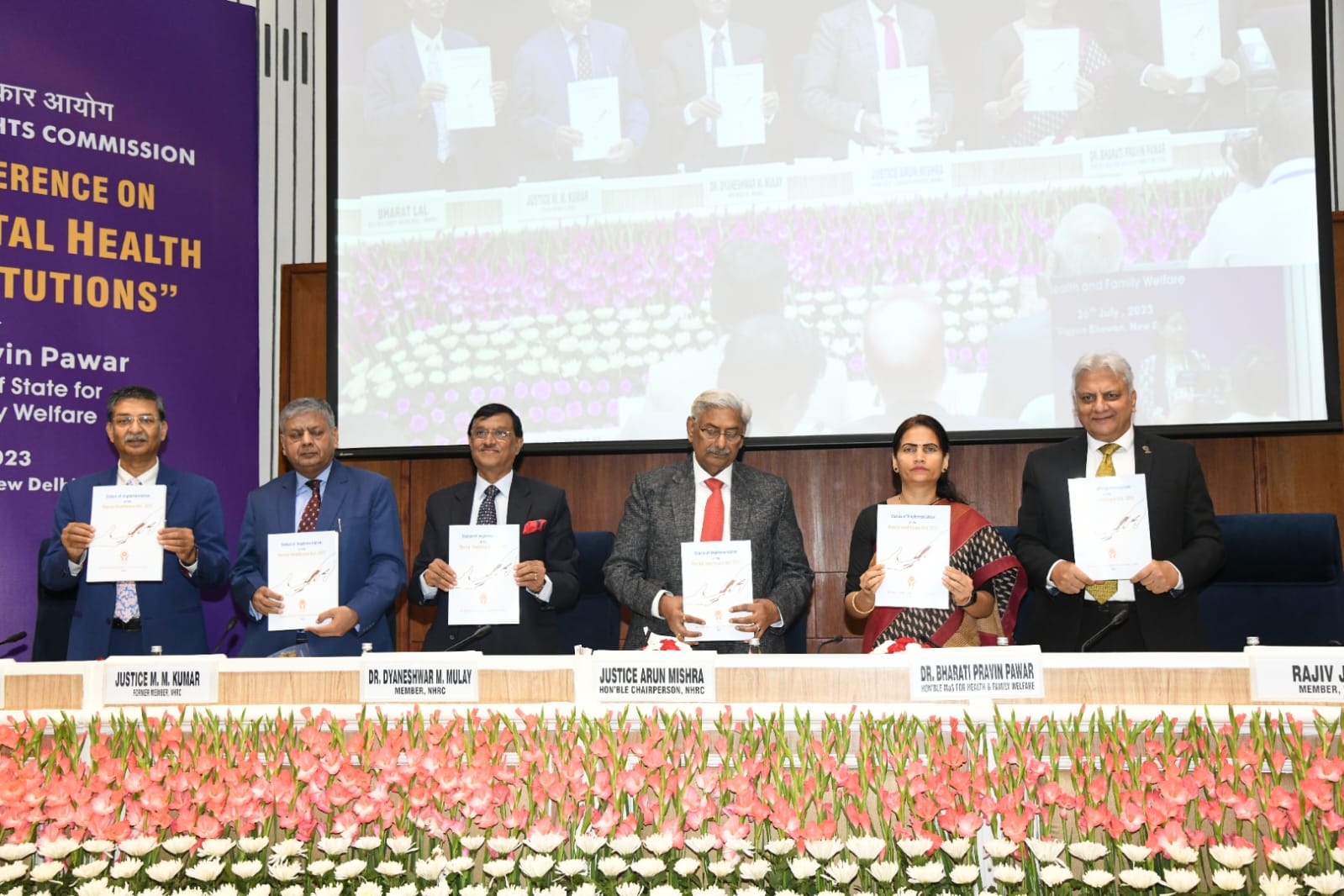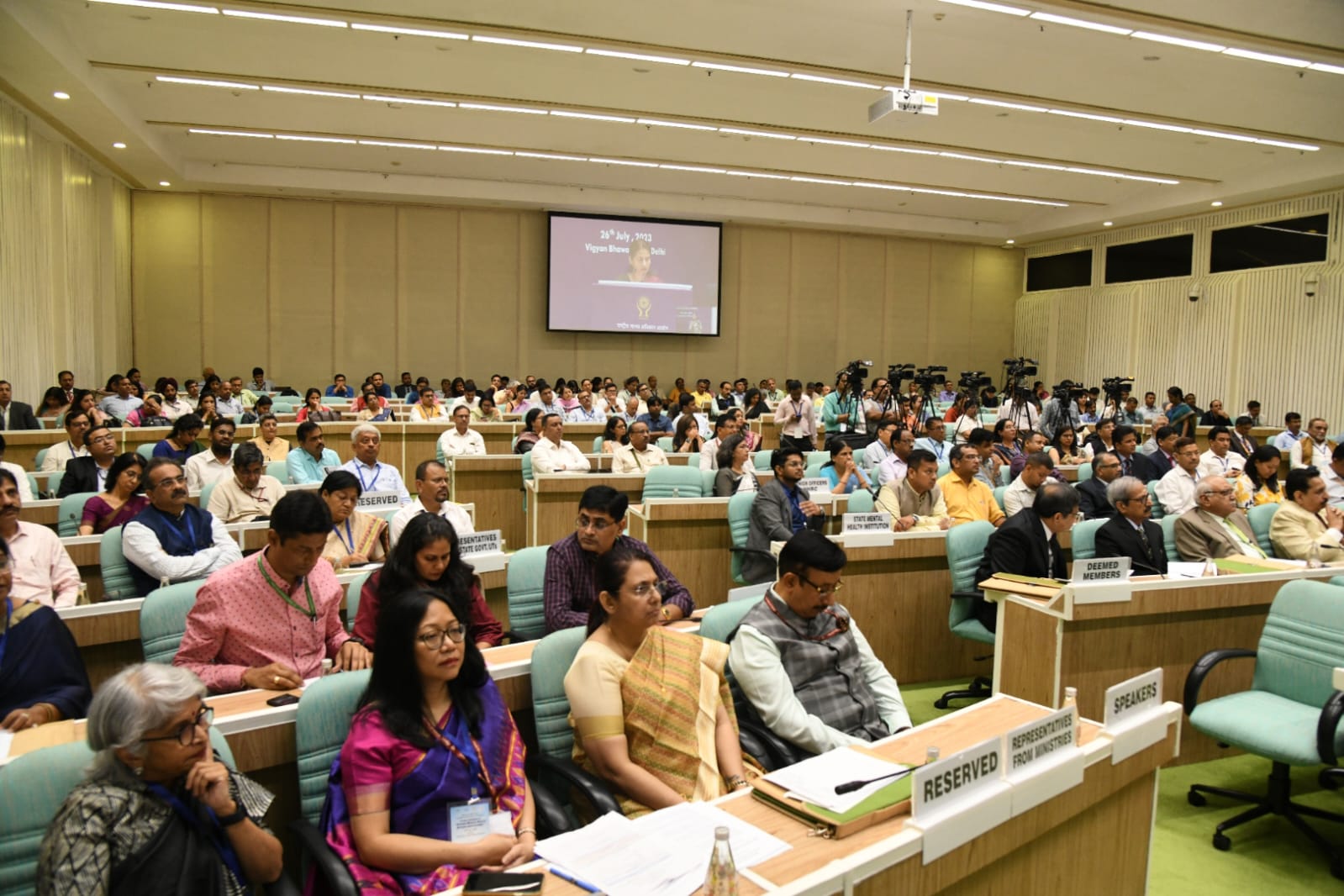Union Minister of State for Health and Family Welfare Dr. Bharati Pravin Pawar inaugurates NHRC National Conference on ‘Moving Mental Health Beyond Institutions’
Press Release
National Human Rights Commission
26th July, 2023, New Delhi
Union Minister of State for Health and Family Welfare Dr. Bharati Pravin Pawar inaugurates NHRC National Conference on ‘Moving Mental Health Beyond Institutions’
It is important to remove the stigma attached with mental illness that prevents individuals from seeking the help that they need: Dr Bharati Pravin Pawar
We must encourage open conversations that foster understanding and compassion to eliminate mental health stigma. We require empathy towards mental illness, not mere sympathy: Justice Arun Mishra
The Union Minister of State for Health and Family Welfare, Dr. Bharati Pravin Pawar said that mental health care is an integral part of health care. She said that it is important to remove the stigma attached with mental illness that prevents individuals from seeking the help that they need.

Dr. Pawar was inauguratingthe National Conference on Moving Mental Health Beyond Institutionsas the chief guest, organized by the National Human Rights Commission (NHRC), India at Vigyan Bhawan in New Delhi. NHRC Chairperson, Mr Justice Arun Mishra, Members, Dr DM Mulay and Mr Rajiv Jain, former Member, MrJustice MM Kumar, SG NHRC, Mr Bharat Lal along withmental health experts, senior officials from Government of India and States, and other dignitaries were present. The objective of the conference was to discuss the challenges in the implementation of the Mental Healthcare Act, 2017 and deliberate on the way forward to address mental health issues.
Highlighting the importance of addressing the challenges of mental health issues and the Mental Healthcare Act 2017, Dr Pawar stated that “the Union govt is promoting the availability of and access to cost-effective treatment of common mental health issues”. She shared that mental health has been included in the flagship Ayushman Bharat scheme. She also stated that “since the launch of the National Tele-Mental Health service, 42 Tele-Manas cells have been established that has already recorded over 2 lakh calls”.

The Union Minister underlined the need for a new mental healthcare paradigm that transcends the limitations of institutions and focuses on community-based support. She suggested yoga practices, which has been embedded in our culture and now has an international recognition, in schools for mental well-being of students. She further emphasized that its right time for India to lead the way in mental healthcare through its ancient practices of yoga and meditation.
She urged the experts to deliberate on the pressing issues of mental health challenges in India and work towards a future where mental healthcare is accessible, affordable, inclusive and compassionate.
Earlier, NHRC Chairperson, Mr Justice Arun Mishra in his keynote address, said that in a welfare state, it is the state’s obligation to provide medical facilities to every human, which is imperative under Article 147 of the Indian Constitution. Hospitals should run to perfect standards. Promoting quality care with quality rights, providing psychological support, and interventions, including digital and suicide prevention. He said that depression is the leading cause of disability and the abuse of elders and workplace stress is to be cared for.
He appreciated that the initiatives and the policies of the governmentsand described the Mental Healthcare Act, 2017 as an unparallel legal provisions. He also said that a lot needs to be done in the country to cover the ground ensuring proper implementation of the legal framework, facilities and welfare policies for the mentally ill persons. He questioned why funds being provided by the Centre are not fully utilized for improving mental healthcare system.

The NHRC Chairperson said that a hospital is not a place where cured patients should be allowed to stay even for a single extra day. There are about 2,000 cured patients languishing in the mental healthcare institutions which amount to violation of their rights. The problem also restricts the hospital's ability to cater to the needs of new patients who need urgent intervention. Referring to the visits of the Commission and its Special Rapporteur to the 47 Mental Healthcare Hospitals and Institutions from July, 2022 to January, 2023, he said that lack of serious coordination was visible among various agencies such as district administration, the police and the mental health centre officials to facilitate halfway homes or return of cured patients to their families. He expressed the hope that there is better coordination among authorities to streamline procedures and improve this situation. He said that lack of proper infrastructure in some of the Mental Health Institutions resembles like a lockup situation. Patients and recovered persons should also be taken out for relaxation.
Justice Mishra said that we must integrate mental health education into our schools, colleges, and workspaces. Setting up healthy boundaries with social media is also necessitated.
Dr. V K Paul, Member (Health), NITI Aayog while chairing session on way forward said that infrastructure and human resources of mental health institutions comprises an important aspect related to ensuring optimum high-quality care of individuals with mental health issues and problems. He gave some excellent suggestions to overcome the shortage of psychiatrists, beds and trained human resources to deal with mental health issues. Mrs. Priti Sudan, Member, UPSC and former Health Secretary, Government of India highlighted the need to strengthen the primary health care facilities and focused on the importance of infrastructural aspects, human resources, participation in District Mental Health Programs and sensitizations for better mental healthcare in the country.
Earlier, Mr Bharat Lal, Secretary General, NHRC giving an overview of the conference, said thatmental health is an integral part of health. Moving beyond institutions encourages early intervention and prevention strategies. By providing accessible and proactive community-based care, we can identify mental health concerns early and intervene before they escalate.He said that the Commission is committed to take forward the cause of mental healthcare in consultation with experts and various stakeholders to further improve the mental healthcare system in the country.
On the occasion, two NHRC publications were also released. These included, ‘Mental Health: Concern for All – In Context of the Mental Healthcare Act, 2017’ and a report on ‘Status of Implementation of the Mental Healthcare Act, 2017’.
Dr R K Dhamija, Director, Institute of Human Behaviour and Allied Sciences, IHBAS, said that innovative forms of mental health care such as Mobile Mental Health Units and School Mental Health Initiative should be encouraged for mental well-being especially of children.
Dr Pratima Murthy, Director, National Institute of Mental Health and Neurosciences, NIMHANSappreciating the efforts by NHRC in promoting and protecting the human rights of mentally ill persons, said that the continuous inspections and monitoring by the Commission has led to increase in budget and financial resources to mental health institutions, improvement in food quality, decrease in overcrowding and better rehabilitation facilities.

The National Conference on Moving Mental Health Beyond Institutions is divided into four thematic sessions in addition to the inaugural and valedictory sessions. These include ‘Challenges in implementation of the Mental Healthcare Act, 2017’, ‘Infrastructure& human resource of mental health establishments – Way Forward’, ‘Rights of persons with mental illness, including reintegration, rehabilitation and empowerment’ and ‘Latest trends in critical care of mental health, international perspective & Way Forward’. The panelists include Chairpersons and Members of State Human Rights Commissions, NHRC special Rapporteurs, senior officers, subject matter experts, members of civil societies, mental healthcare professionals and representatives from various State Mental Healthcare Institutions and officials from the Centre and State governments.
*****







 राष्ट्रीय मानव अधिकार आयोग, भारत
राष्ट्रीय मानव अधिकार आयोग, भारत

